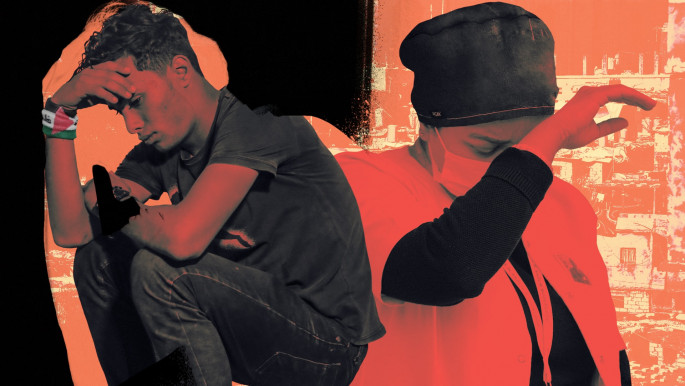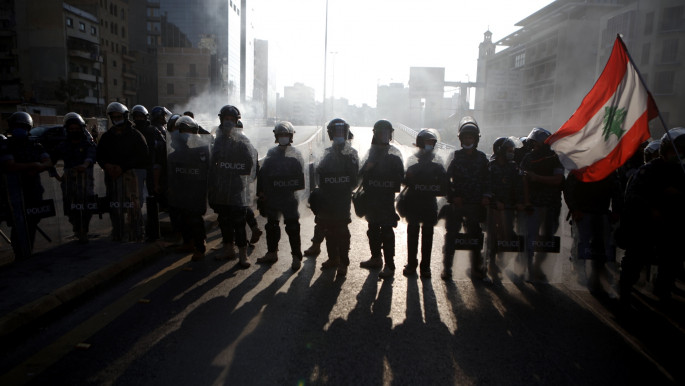'Starving is worse': Syrian refugees pushed to the edge of survival under Lebanon's lockdown
Children ran up and down the alleyway of the Syrian refugee camp in Lebanon's Bekaa Valley as two women squatted down next to each other with a plate of courgettes they were preparing for that night's dinner.
The women were not wearing gloves or face masks while they worked, undaunted about contracting the coronavirus despite widespread fears around the globe. Rather, they were more concerned about making sure that their families had a meal in front of them that evening.
Lebanon began a national lockdown on 15 March after coronavirus cases exploded in the small country. It has also, however, faced an increasingly dismal economic crisis since mid-2019, with the price of goods drastically rising and the value of Lebanon's national currency, the lira, devaluating at a rapid rate.
In order to better help the Syrian refugee community, the aid NGO Sawa trained with the Lebanese Red Cross in order to know the Covid-19 symptoms to look out for, as well as what safety precautions should be taken.
"When we are in the camps, we wear gloves and masks," Omar Abdallah, who works with Sawa, told The New Arab.
"We held awareness sessions to educate people in the camps and we trained some people to know what to do. We also distributed brochures about the virus that told them how to prevent it. A month ago, we as an NGO were stricter when it came to visiting the camps. However, recently it has been less so."
 |
You know that you might die if you get it, but we are dying slowly anyway |
 |
When the lockdown first began, the refugees listened to the restrictions and stayed indoors, only venturing out if it was absolutely necessary. However, that only lasted for about one week and they soon saw their costs drastically increase as inflation rose and the value of their money plummeted.
"When the corona[virus] issue started we stayed home for one week," Fuda Berri, who came to Lebanon from Homs, told The New Arab.
"We just said hello to our neighbours. For the most part everyone was very strict and followed the guidelines to stay indoors that week. Before the kids would go to school or work, even though it was low-paid. However, now, there is nothing. We could buy fruits and vegetables before, but we can't afford anything. Everything is worse now. Everything costs more."
The local municipality was also much stricter when it came to enforcing the lockdown during its start. But as economic conditions became worse, Syrian refugees slowly started to defy the stay at home order despite the advice from NGOs like Sawa.
 |
|
| Read more: Lebanon's Anti-Racism Movement is a lifeline for vulnerable migrant workers during coronavirus |
"A month ago, the municipality was much stricter, and you wouldn't see anyone in the streets," Abdallah said. "But since the economy is so bad now, people are going out because they need to get food. Even though we were telling them to stay home, we don't have the financial resources to help them pay for food and rent. So you can't really blame them for going out."
While most people still adhere to the guidelines, refugees have largely disregarded them as they have had to find ways to provide for their families, since they are unable to find work and the devaluating currency coupled with the inflating prices has made it nearly impossible for them to buy basic necessities with the already limited income that they receive from the UNHCR.
"Our lives are hell," Fatima Khalifa, a refugee from Homs, explained to The New Arab. "Before, we could buy things for Ramadan for 15,000 lira (£7.88), but we can't get anything for less than 30,000 (£15.75). Meat and chicken are both expensive. I had to buy cow's fat since we can't afford meat anymore. This is not good because it has diseases. But what can we do? We're going to die anyway and we have no other options."
According to Abdallah, the UNHCR provides refugees with 50,000 lira (£26.25) a month in order to buy food, medicine, hospital visits and other necessities. Now, though, that money is not enough for the struggling community, especially since capital controls have made withdrawing cash increasingly difficult.
"We are three people and the UN gives us 50,000 lira a month," Berri explained. "I bought a gas tank for 20,000 lira (£10.50) and I paid for that as well as a few things for Ramadan, but, after that, I had no money left. I asked people to lend me some money, but no one would."
Berri, like the majority of refugees, does not work and relies on outside aid in order to get by. While some people are able to find jobs, Berri does not have that luxury since her husband was killed in Syria, though his body was never found, and now has to take care of her two children on her own.
 |
Coronavirus is more merciful than the hunger and everything being expensive now |  |
For those who have health issues, the lack of money adds to their worry. Both Assaf and Hasna Al-Sayyed, his wife, have health problems, but are unable to visit the hospital, get tests and can barely afford their medication.
"I have high blood pressure," Assaf said, "I have a problem breathing too and I have to use a machine at night while I sleep in order to breath. For the last three months, I have been asking for money to pay for my heart medicine because I can't afford it otherwise."
While many refugees in the camp are not worried about the coronavirus, Al-Sayyed expressed concern due to her and her husband's ill health.
"I'm worried about corona[virus]. Especially when I go to the hospital. The fact that I can't take money out from the banks, I can't pay to go to see the doctor and have tests done," she said.
"I want to feel safe and to be able to go to the doctor since we are sick," Al-Sayyed later pleaded. "If anyone can hear me, please understand that we are suffering and need real help."
 |
|
| Read more: Coronavirus heightens mental health crisis in Lebanon's claustrophobic Palestinian refugee camps |
Others, such as Khalifa, are more concerned about their children and being able to provide for them, but are largely unable to do so. When asked if she was worried about the spread of coronavirus, she said that they were all slowly dying already.
"God no," she exclaimed. "You know that you might die if you get it, but we are dying slowly anyway. Corona[virus] is more merciful than the hunger and everything being expensive now. I should put diapers on my son, and he should drink milk, but I can't afford it."
Conditions in the camp have also worsened since the economic crisis and lockdown started. Some people have become so desperate to provide for their families that they have begun stealing from others in the camp.
"People have gotten so hungry here that people are stealing food from each other," Berri explained. "My neighbour had a motorcycle that he used to get supplies for his family. But his neighbour stole it and sold it to get money to support his family."
 |
Lebanon has faced an increasingly dismal economic crisis since mid-2019, with the price of goods drastically rising |  |
In addition to paying for food, refugees are also having to pay rent for the land that they are living on in the camps, or a significantly higher rate if they are staying in a house.
"The main issues that people have, are when it comes to their food and water," Abdallah said. "They couldn't really move to get anything since there was no public transportation [during the lockdown]. But, even when they went to get something, they can't afford it".
"The second biggest problem is paying to rent the land that they are living on and the third is the health issue. This is why we are making programmes to distribute food and holding awareness sessions about the virus."
Families are also unable to afford schooling for their children, which can cost several hundred pounds. Because of this, many of the children are unable to read or write unless an NGO provides free or discounted education for the children.
"I have an 11-year-old child who can't read or write," Khalifa said. "If we could travel, then our children could get a good education. But in Lebanon, we need to pay 900,000 lira (£472.55). We don't have that. My son can't even read his own name."
 |
|
| Read more: 'Coronavirus the least of our worries': Lebanese defy lockdown for second wave of protests |
Due to the worsening conditions, many refugees dream of leaving Lebanon either to return to their homes in Syria or for an opportunity to start a new life abroad. For Berri, her cousin lives in Canada and often tells her about life in the North American country. When Berri compares her life in Lebanon to her cousin's life in Canada, she cannot help but notice the difference in quality of life.
"My cousin in Canada always tells me how nice they are treated there with a good education for the children. Here [in Lebanon], we are treated as animals," she said. "A 12-year-old Lebanese child comes to the camp and terrorises us, but we can't do anything about it because it is his country and we are refugees."
"If the UN called and said that I can travel," Berri solemnly added, "then I would go with my children without a second thought. If I could travel, then I would and never go back to Syria because there are still problems there."
With her children unable to get an education and with the economy continuing to spiral making it nearly impossible for her to feed and care for her family, Khalifa expressed anger at the international community for its lack of help for the refugee community in Lebanon.
"They [the international community] got the refugees to Lebanon and just left us here," she stated angrily. "My son needs to learn. It's his right! And I have the right to be a good mother and take care of my children. We're tired of this life."
Nicholas Frakes is a freelance journalist who reports from London, the Middle East and North Africa.
Follow him on Twitter: @nicfrakesjourno





 Follow the Middle East's top stories in English at The New Arab on Google News
Follow the Middle East's top stories in English at The New Arab on Google News


